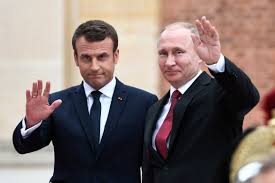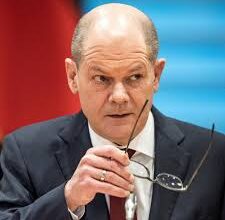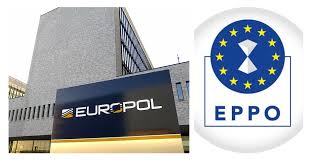French President Emmanuel Macron is scheduled to meet with Russian President Vladimir Putin in Moscow on Monday in an effort to de-escalate the tense situation in Ukraine.
The presence of an estimated 100,000 Russian troops near Ukraine has fanned Western fears of an impending invasion, with White House national security advisor Jake Sullivan warning on Sunday that Russia might invade Ukraine “any day,” resulting in a confrontation with “enormous human cost.”
Russia has denied any plans to attack its neighbor, but it is pressing the United States and its allies to prohibit Ukraine and other former Soviet republics from joining NATO, suspend arms deployments, and pull the NATO military out of Eastern Europe. The demands were rejected by both Washington and NATO.
Macron, who will meet with Russian President Vladimir Putin in the Kremlin before visiting Ukraine on Tuesday, stated last week that “conversation with Russia and de-escalation” are his top priorities.
Macron spoke with US President Joe Biden on the phone on Sunday before departing for Moscow. The two talked about “ongoing diplomatic and deterrence measures in response to Russia’s continuous military build-up on Ukraine’s borders, and restated their support for Ukraine’s sovereignty and territorial integrity,” according to a statement released by the White House.
In the call, Macron tried to establish “excellent coordination” with Biden, according to the French presidency.
“We won’t get unilateral gestures,” Macron said in an interview with the French weekly Journal du Dimanche published on Sunday. “However, it is necessary to prevent a deterioration of the situation before creating confidence gestures and processes.”
“Russia’s geopolitical goal today is definitely not Ukraine,” Macron added, “but it is to explain the norms of cohabitation with NATO and the EU.” “While it is fair for Russia to raise the issue of its own security, the security and sovereignty of Ukraine or any other European state cannot be compromised.”
In keeping with the high-level diplomacy, German Chancellor Olaf Scholz will meet with Biden on Monday for talks expected to center on the Ukraine impasse. Scholz will visit Kyiv and Moscow on February 14-15.
Scholz has declared that if Russia invaded, it would pay a “heavy price,” but his government has come under fire for refusing to give Ukraine lethal weaponry, increase its army presence in Eastern Europe, or specify which sanctions it would support if Russia invaded.
Germany’s Defense Minister, Christine Lambrecht, suggested on Sunday that the country would send extra troops to Lithuania to bolster its presence on NATO’s eastern flank.
Additional US forces have been ordered to be deployed to Poland, Romania, and Germany, and a few dozen elite US troops and equipment were observed landing in southeastern Poland near the Ukrainian border on Sunday, with hundreds more infantry troops from the 82nd Airborne Division expected to arrive.
In 2015, France and Germany aided in the brokering of a peace settlement for eastern Ukraine in order to put an end to hostilities between Ukrainian forces and Russia-backed separatists that had erupted the year before following Russia’s annexation of Ukraine’s the Crimean Peninsula.
Although the deal struck in Minsk, Belarus, helped to end large-scale violence, efforts to reach a political settlement have faltered, and periodic skirmishes have occurred along the sensitive line of contact in Ukraine’s eastern industrial heartland, known as Donbas.
The leaders of Russia, Ukraine, France, and Germany last met in December 2019 in Paris for the so-called Normandy format summit, but they were unable to overcome major disagreements.
Presidents’ advisers from the four nations met in Paris on Jan. 26 to discuss the Russian military buildup, but no evident progress was made, so they agreed to meet again in Berlin in two weeks.
President Volodymyr Zelenskyy of Ukraine has pushed for another four-way Normandy conference, but the Kremlin has indicated that such a gathering would only make sense if the parties agree on the following steps to grant the rebel east special status.
Putin and his aides have urged France, Germany, and other Western allies to press Ukraine to follow through on its commitments under the 2015 agreement, which included substantial autonomy for the rebel east and a broad amnesty for separatists. Only once those conditions were met, according to the deal, would Ukraine be able to reclaim control of its border with Russia in insurgent areas.
Many in Ukraine regard the Minsk agreement as a betrayal of national interests, and its implementation has stopped. Against the backdrop of recent tensions, Ukrainian officials have issued a strong warning to the West not to put pressure on Ukraine to follow the agreement.
Last week, Oleksiy Danilov, Ukraine’s National Security, and Defense Council secretary told reporters that Ukraine’s attempt to implement the Minsk agreement could spark internal turmoil, which would play into Moscow’s hands.
Dmytro Kuleba, Ukraine’s foreign minister said Moscow wants the rebel regions reintegrated into Ukraine so it can use them to successfully hinder the country’s pro-Western ambitions, but that “this is not going to happen.”




















